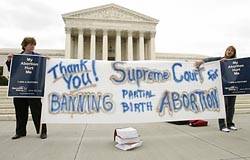Benedict And Liberation Theology
SÃO PAULO — When Pope Benedict XVI comes to Brazil this month, he’ll be visiting the country where liberation theology has had its greatest impact.
But he’s already well acquainted with liberation theology. While serving as prefect of the Congregation for the Doctrine of the Faith in the 1980s, Cardinal Joseph Ratzinger oversaw the preparation of a document that specifically denounced its theological flaws.
In 1984, the congregation published an “Instruction on Certain Aspects of the Theology of Liberation.”
Its purpose was “to draw the attention of pastors, theologians, and all the faithful to the deviations, and risks of deviation, damaging to the faith and to Christian living, that are brought about by certain forms of liberation theology that use, in an insufficiently critical manner, concepts borrowed from various currents of Marxist thought.”
The conflation of Marxist-derived concepts with Christian thought, the Vatican document stated, has led “to a disastrous confusion between the ‘poor’ of the Scripture and the ‘proletariat’ of Marx. In this way they pervert the Christian meaning of the poor, and they transform the fight for the rights of the poor into a class fight within the ideological perspective of the class struggle.”
The instruction warned “the very nature of ethics is radically called into question because of the borrowing of these theses from Marxism. In fact, it is the transcendent character of the distinction between good and evil, the principle of morality, which is implicitly denied in the perspective of the class struggle.”
Moreover, “An exclusively political interpretation is thus given to the death of Christ. In this way, its value for salvation and the whole economy of redemption is denied.”
The Vatican instruction stressed that Catholic catechesis and formation must reject the errors of liberation theology and instead “present the ‘whole message of salvation’ and the imperatives of true liberation within the framework of this whole message.”
“In this full presentation of Christianity, it is proper to emphasize those essential aspects that the ‘theologies of liberation’ especially tend to misunderstand or to eliminate, namely: God and true man; the sovereignty of grace; and the true nature of the means of salvation, especially of the Church and the sacraments,” the document stated. “One should also keep in mind the true meaning of ethics in which the distinction between good and evil is not relativized, the real meaning of sin, the necessity for conversion, and the universality of the law of fraternal love. One needs to be on guard against the politicization of existence which, misunderstanding the entire meaning of the Kingdom of God and the transcendence of the person, begins to sacralize politics and betray the religion of the people in favor of the projects of the revolution.”
Register Staff
- Keywords:
- May 06-12, 2007













